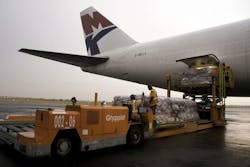Africa’s Search for Consistent Ground Handling
The African continent is a region of the world where the airline industry has significant potential for expansion, but at the moment the picture is not uniform with some parts of the African continent performing pretty well and others being characterized by significant political instability and economic hardships.
According to Rui Nascimento, deputy director of planning at ground handling service provider GH Assist of Angola, the African aviation industry has been developing very timidly as a consequence of the great financial difficulties that exist to different degrees more or less everywhere.
“There are many airline companies that are closing and others that are forced to operate with much smaller aircraft, or that tend to decrease frequencies. However, despite these difficulties some companies like Ethiopian Airlines, South African Airways, Kenya Airways and Air Morocco, are still holding and maintaining some market in Africa and in the rest of the world,” he says.
“Similarly the aircraft ground handling industry has also been affected in some way by this crisis, and, in some countries, these services are provided by foreign companies,” Nascimento continues. “In other countries, often partnerships are being made with other companies in the industry. This situation is often coupled with the fact that often the handling equipment still remains very expensive. Moreover, the purchase of spare parts can also be a big problem and so the maintenance of some pieces equipment is also somehow deficient at times.”
Despite the difficulties in some African countries, there are the likes of master plans for aircraft ground handling infrastructure development.
“Firstly, these plans consist of the reconstruction and improvement of runways, the assembly of safety equipment to assist aircraft and crews and the conduct of various audits – among them those of ICAO. Some aircraft ground handling companies are already being certified by IATA, more specifically through ISAGO audits. And above all, the bet is on the training of line operatives in ways that follow the evolution of training that exists around the world,” says Nascimento.
GH Assist is among the aircraft ground handling players in Africa that are committed to providing international-level airline ground service to its customers.
“Our company was founded in 1997 and we are the national leader of ground handling in Angola. With a diverse fleet of equipment, state-of-the-art technology and more than 600 skilled operatives, we offer a wide range of ground handling services in accordance with international quality standards,” explains Nascimento. “In 2007, we started providing services in some provincial airports, namely in Cabinda, Onjiva and Lubango. At that time, as a consequence of the development plans and the strengthening of our customer portfolio, there was an increase in revenues and, consequently, an improvement in net results. Today, our main objective is to provide a quality and safety service while offering assistance to aircraft on land, passengers, cargo and mail, at the level of Angolan airports.
“In the last several months, we have been working with consultants to create the conditions for the certification of our operations to the ISAGO system, which is in fact a set of more than 200 procedures and standards that ground handling operators must observe during their activities, in order to ensure that the operations are actually safe,” he adds. “After a long period of preparation, with the development of numerous manuals, the adoption of a set of procedures, as well as the implementation of a massive employee training plan, in October 2015 the system was assembled. After having complied with the recommendations made to the system, we were validated and the ISAGO registration was granted in January 2016. The registration is an instrument that offers guarantees to airlines that the assistance we provide to them on land is of the internationally required standard as far as operational safety is concerned. Today we have the honor and privilege of being part of a still small group of ground handling service providers in Africa, who are considered to have properly tuned processes and procedures, as well as their properly trained human resources, to respond positively to the handling needs of the industry.”
With regard to training supporting aircraft ground handling infrastructure development, Africa has a very particular situation to deal with.
“Notoriously, the African continent has unfortunately been systematically attacked by civil wars, some have lasted until now, and with this, the education of many parts of the population is still very precarious. However, several governments have taken some significant steps towards the education of the populations. Nevertheless, much still needs to be done,” says Nascimento. “In the case of Angola there are already some companies specialized in the training of aviation professionals. In Ethiopia there are several schools and training centers to support aviation activities serving nationals as well as airline staff from other parts of Africa.”
Despite some difficulties there are opportunities in Africa for international investors in ground assistance infrastructure.
“Since Africa, as an industry, is not well known, and because the investment costs are very high, investment is still very timid. Moreover, in some countries there is the support of public companies,” says Nascimento. “However, there are also many partnerships with foreign companies, and especially with regard to training there is a very fertile market and it can still be widely exploited by companies wishing to invest in partnerships with African players.”
About the Author

Mario Pierobon
Dr. Mario Pierobon provides solutions in the areas of documentation, training and consulting to organizations operating in safety-sensitive industries. He has conducted a doctoral research project investigating aircraft ground handling safety. He may be reached at [email protected].
